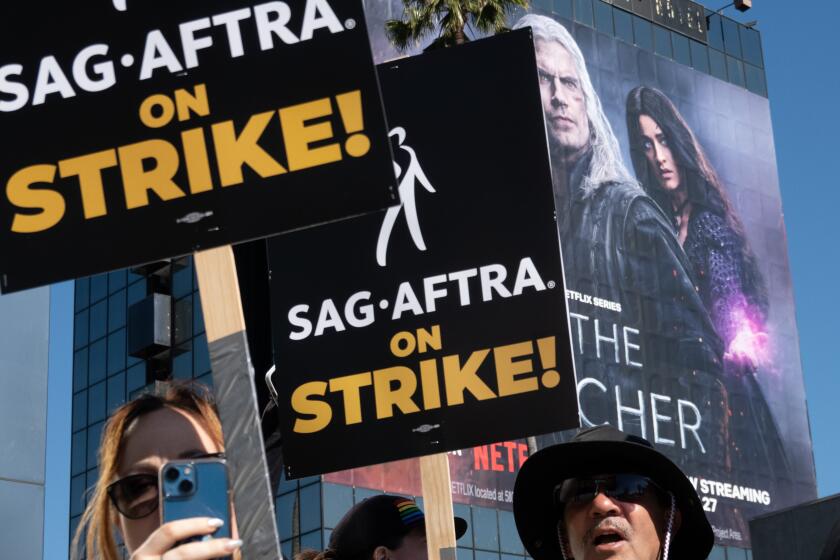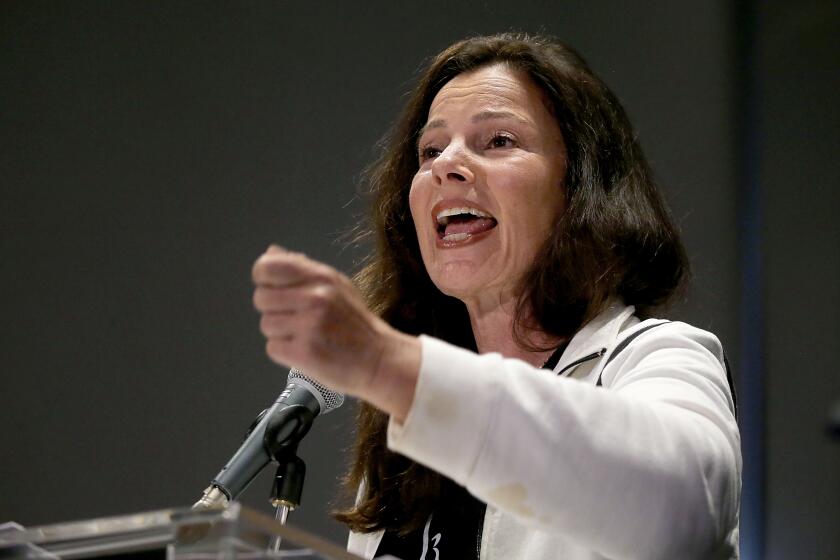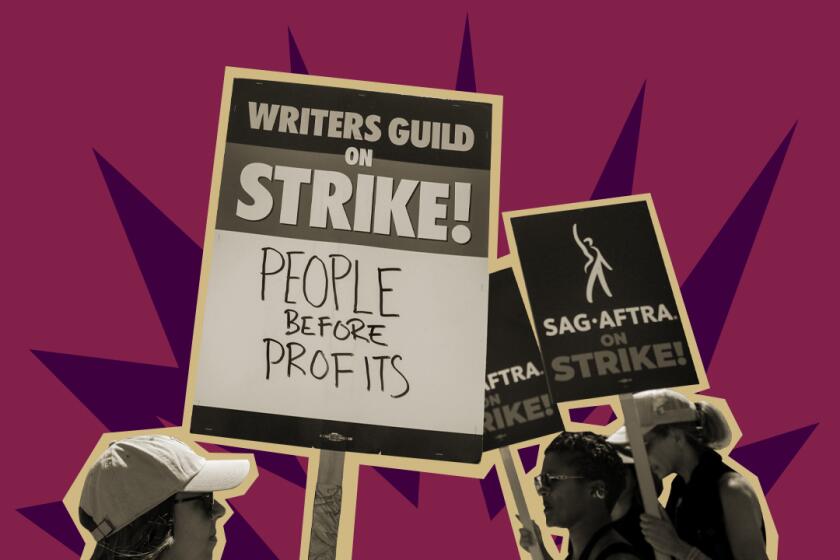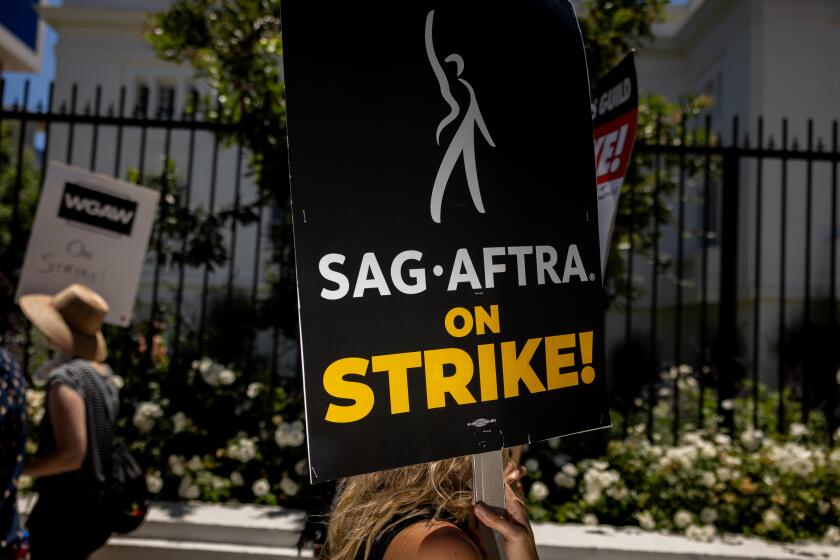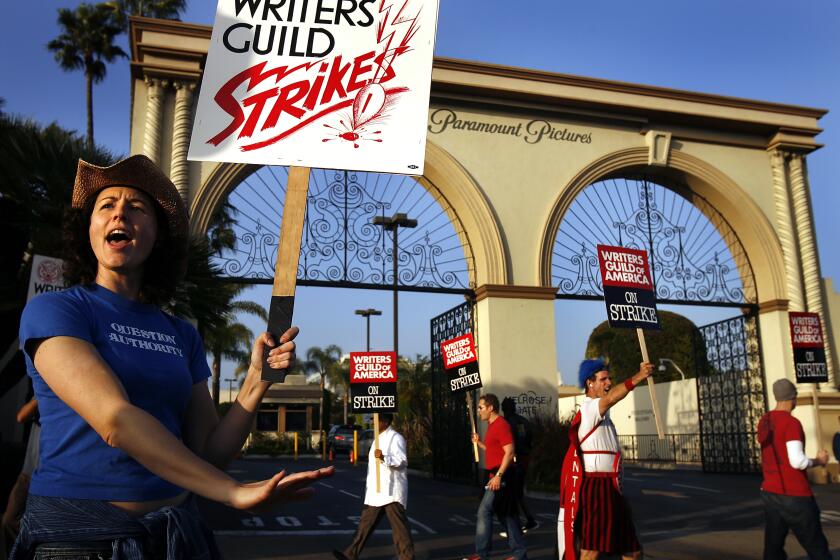Column: The studios thought they could handle a strike. They might end up sparking a revolution
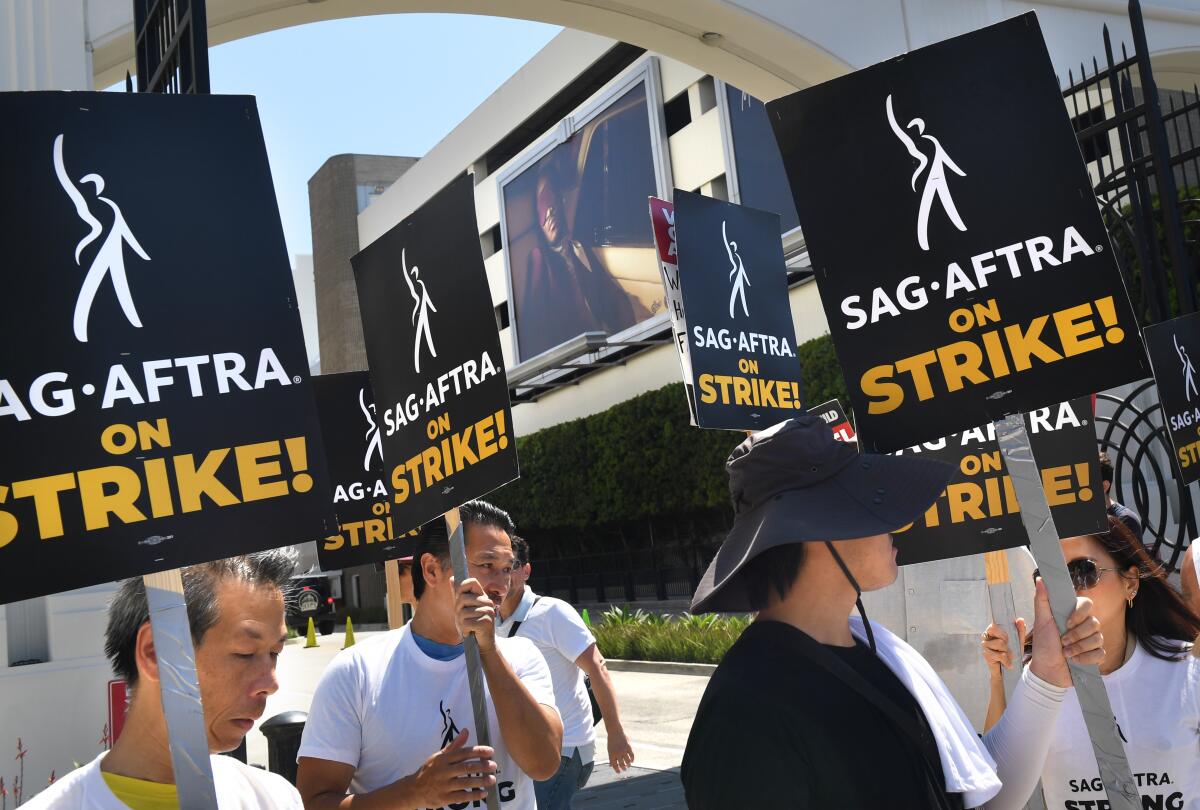
If you want to start a revolution, tell your workers you’d rather see them lose their homes than offer them fair wages. Then lecture them about how their “unrealistic” demands are “disruptive” to the industry, not to mention disturbing your revels at Versailles, er, Sun Valley.
Honestly, watching the studios turn one strike into two makes you wonder whether any of their executives have ever seen a movie or watched a television show. Scenes of rich overlords sipping Champagne and acting irritated while the crowd howls for bread rarely end well for the Champagne sippers.
This spring, it sometimes seemed like the Hollywood studios represented by the Alliance of Motion Picture and Television Producers were actively itching for a writers’ strike. Speculations about why, exactly, ran the gamut: Perhaps it would save a little money in the short run and show the Writers Guild of America (perceived as cocky after its recent ability to force agents out of the packaging business) who’s boss.
More obviously, it might secure the least costly compromise on issues like residuals payments and transparency about viewership.
The actors’ union published its proposals, with what it says were the counterproposals from Hollywood studios. The AMPTP accused SAG-AFTRA of mischaracterizing the talks.
But the 20,000 members of the WGA are not the only people who, having had their lives and livelihoods upended by the streaming model, want fair pay and assurances about the use of artificial intelligence, among other sticking points. The 160,000 members of the Screen Actors Guild-American Federation of Television and Radio Artists share many of the writers’ concerns. And recent unforced errors by studio executives, named and anonymous, have suddenly transformed a fight the studios were spoiling for into a public relations war they cannot win.
Even as SAG-AFTRA representatives were seeing a majority of their demands rejected despite a nearly unanimous strike vote, a Deadline story quoted unnamed executives detailing a strategy to bleed striking writers until they come crawling back.
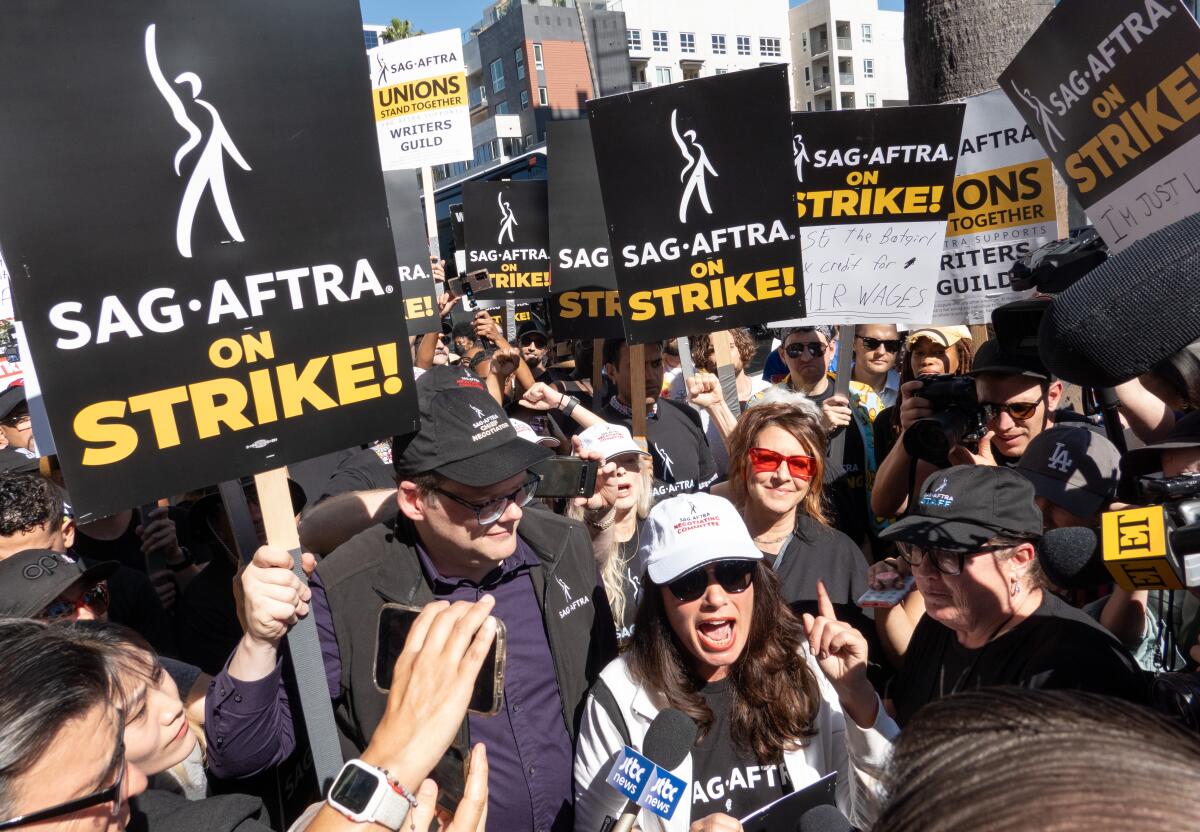
Days later, when an actors’ strike seemed imminent, Disney Chief Executive Bob Iger took time away from the Sun Valley Conference in Idaho not to offer compromise but to lecture. He told CNBC’s David Faber that the unions’ refusal to help out the studios by taking a lesser deal is “very disturbing to me.”
“There’s a level of expectation that they have that is just not realistic,” Iger said. “And they are adding to the set of the challenges that this business is already facing that is, quite frankly, very disruptive.”
If Iger thought his attempt to exec-splain the situation would make actors think twice about walking out, he was very much mistaken. Instead, he handed SAG-AFTRA President Fran Drescher the perfect opportunity for the kind of speech usually shouted atop the barricades.
Read SAG-AFTRA President Fran Drescher’s entire speech Thursday announcing the actors’ strike.
“We are the victims here,” she said Thursday, marking the start of the actors’ strike. “We are being victimized by a very greedy entity. I am shocked by the way the people that we have been in business with are treating us. I cannot believe it, quite frankly: How far apart we are on so many things. How they plead poverty, that they’re losing money left and right, when giving hundreds of millions of dollars to their CEOs. It is disgusting. Shame on them. They stand on the wrong side of history at this very moment.”
Cue the cascading strings of “Les Mis,” bolstered by images of the most famous people on the planet walking out in solidarity: the cast of “Oppenheimer” leaving the film’s London premiere; the writers and cast of “The X-Files” reuniting on the picket line.
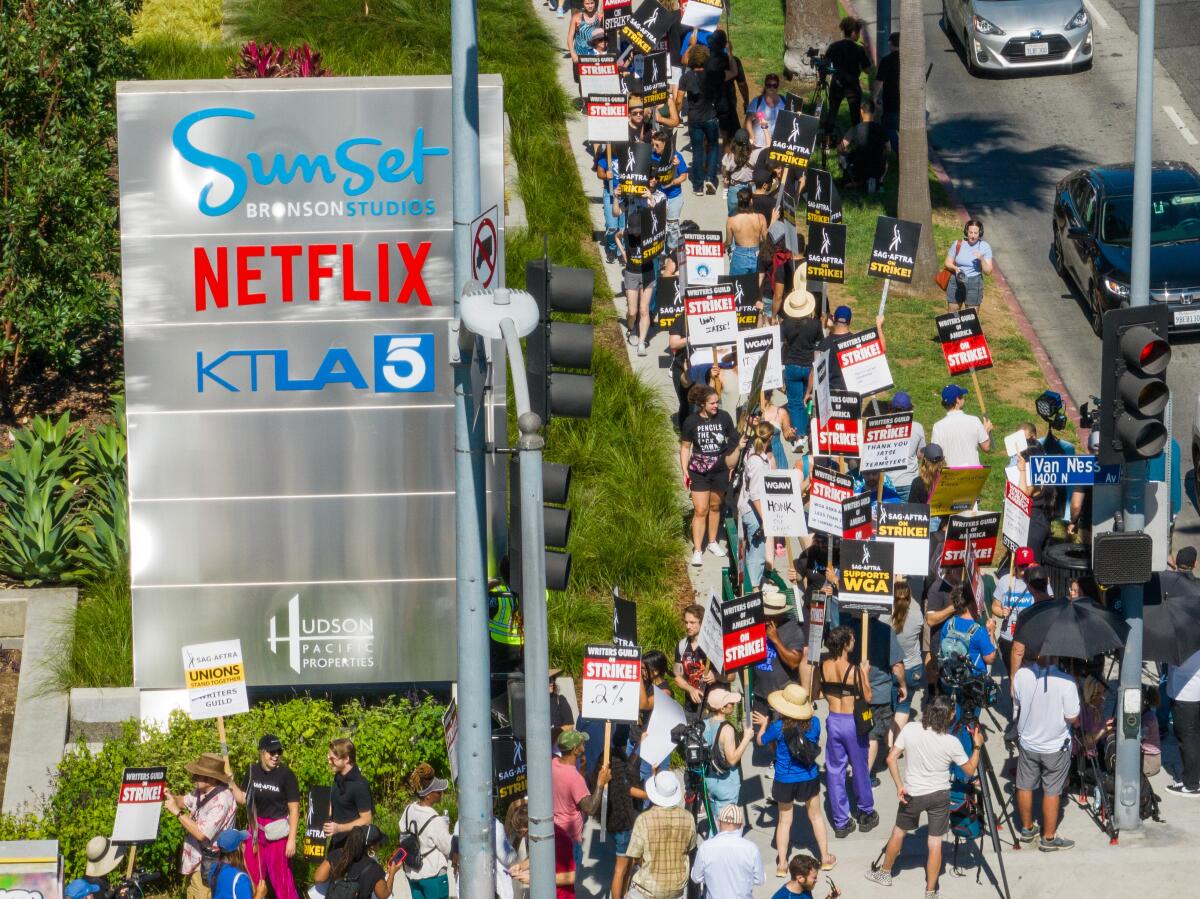
A few days later, Barry Diller, chairman and senior executive of IAC and Expedia Group and a former Hollywood studio chief, suggested that studio executives and top-earning actors take a 25% pay cut to bring a quick end to the strikes and help prevent “the collapse of the entire industry.”
When Diller is telling executives to take a pay cut to avoid destroying their industry, it is no longer a strike, or even two strikes. It is a last-ditch attempt to prevent le déluge.
Yes, during the 2007-08 writers’ strike, picketers yelled noncomplimentary things at executives as they entered their respective lots. (“What you earnin’, Chernin?” was popular at Fox, where Peter Chernin was chairman and chief executive.) But that was before social media made everything more immediate, incendiary and personal. (Even if they have never seen a movie or TV show, one would think that people heading up media companies would understand how media actually work.)
Hollywood faces a leadership vacuum as it weathers an awful summer of two strikes and a soft box office. But who will step up?
Even at the most heated moments of the last writers’ strike, executives like Chernin and Iger were seen as people who could be reasoned with — in part because most of the executives were running studios, not conglomerations, but mostly because the pay gap between executives and workers, in Hollywood and across the country, had not yet widened to the reprehensible chasm it has since.
Inside the business of entertainment
The Wide Shot brings you news, analysis and insights on everything from streaming wars to production — and what it all means for the future.
You may occasionally receive promotional content from the Los Angeles Times.
Now, the massive eight- and nine-figure salaries of studio heads alongside photos of pitiably small residual checks are paraded across legacy and social media like historical illustrations of monarchs growing fat as their people starve. Proof that, no matter how loudly the studios claim otherwise, there is plenty of money to go around.
Topping that list is Warner Bros. Discovery Chief Executive Davd Zaslav. Having re-named HBO Max just Max and made cuts to the beloved Turner Classic Movies, among other unpopular moves, Zaslav has become a symbol of the cold-hearted, highly compensated executive that the writers and actors are railing against.
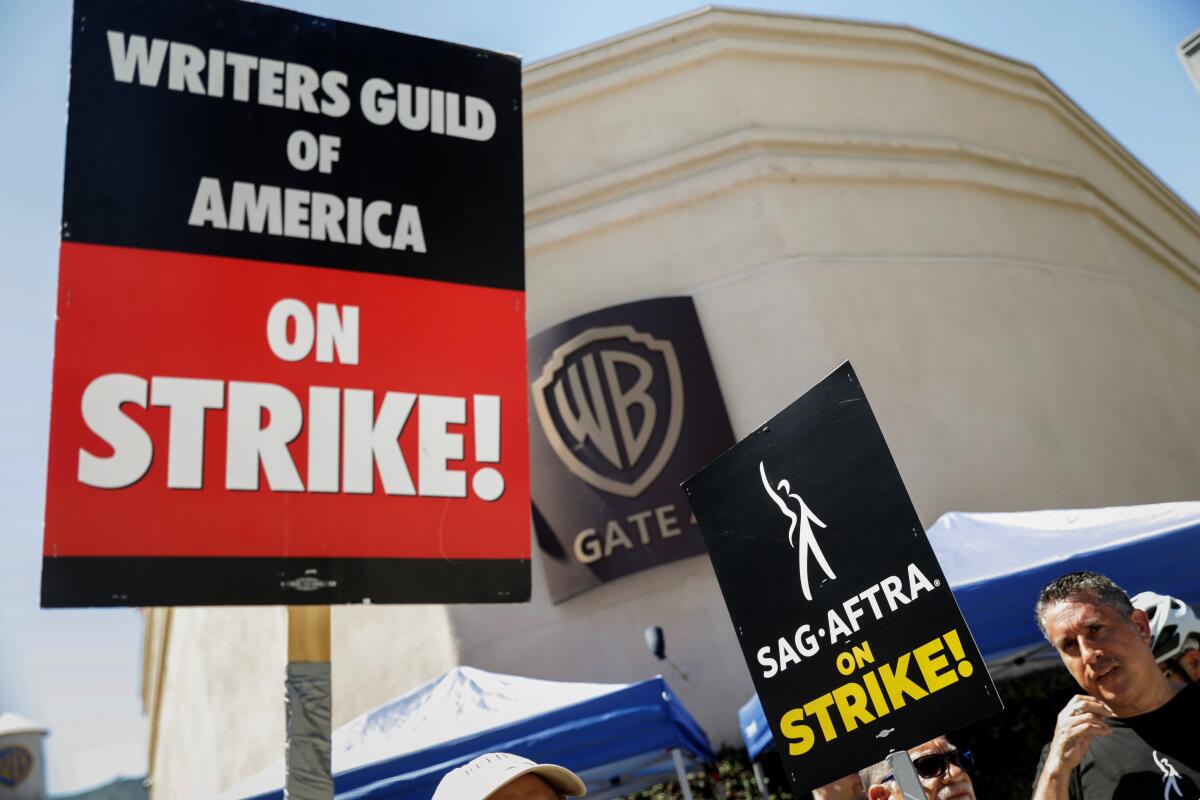
The ferocious criticism of individual executives’ salaries has placed Hollywood’s labor conflict at the center of the conversation about growing wealth disparities in the U.S., which stokes, if not causes, much of this country’s political divisions. It also strengthens the solidarity among the WGA and SAG-AFTRA and with other groups, from hotel workers to UPS employees, in the midst of disputes during what’s been called a “hot labor summer.”
SAG-AFTRA has approved a deal from the studios to end its historic strike. The actors were on strike for more than 100 days.
Unfortunately, the heightened antagonism between studio executives and union members also appears to leave little room for the kind of one-on-one negotiation that helped end the 2007-08 writers’ strike. Iger’s provocative statement, and the backlash it provoked, would seem to eliminate him as a potential elder statesman who could work with both sides to help broker a deal.
Absent Diller and his “cut your damn salaries” plan, there are few Hollywood figures with the kind of experience, reputation and relationships to fill the vacuum.
The last strike cost $4.5 billion in today’s dollars. That’s why the studios need to stop preparing for the next one and start trying to prevent it.
At this point, the only real solution has been offered by actor Mark Ruffalo, who recently suggested that workers seize the means of production by getting back into the indie business, which is difficult to imagine and not much help for those working in television.
It’s the AMPTP that needs to heed Iger’s admonishment. At a time when the entertainment industry is going through so much disruption, two strikes is the last thing anyone needs, especially when the solution is so simple. If the studios don’t want a full-blown revolution on their hands, they’d be smart to give members of the WGA and SAG-AFTRA contracts they can live with.
More to Read
Inside the business of entertainment
The Wide Shot brings you news, analysis and insights on everything from streaming wars to production — and what it all means for the future.
You may occasionally receive promotional content from the Los Angeles Times.
